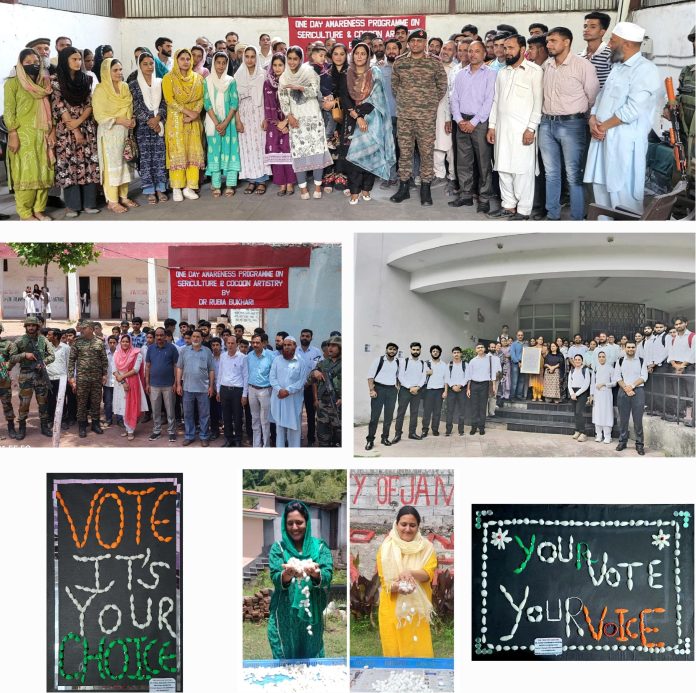Cocoon Artistry, an ancient craft deeply rooted in the traditional silk-making heritage of Jammu and Kashmir, has now become a powerful means of expression, transcending the boundaries of creativity and social utility. One of the key personalities popularizing this traditional art is Dr. Rubia Bukhari, whose initiative—Dr. Rubia Bukhari’s Cocoon Artistry Initiative—has brought Cocoon Artistry into prominence in various aspects of life, from empowering farmers to encouraging civic participation. During the recent Assembly elections, Dr. Bukhari played a significant role in promoting voter awareness and participation through her art, particularly under the SVEEP (Systematic Voters’ Education and Electoral Participation) initiative.
Cocoon Artistry and SVEEP Initiative: Promoting Civic Responsibility
Under the SVEEP initiative aimed at promoting civic responsibility, Dr. Rubia Bukhari adopted a unique approach by integrating Cocoon Artistry with voter awareness campaigns. Through intricate designs and creative messages made from cocoon particles, Dr. Bukhari’s work inspired citizens to exercise their right to vote. Her Cocoon Artistry, reflecting the importance of voting, became a symbol of civic responsibility during the election season.
Dr. Bukhari’s work was widely recognized, with videos of her artwork being shared by the Chief Electoral Officer of Jammu and Kashmir on social media platforms such as Twitter, Facebook and Instagram. These videos encouraged citizens to participate in the ongoing Assembly elections, emphasizing the importance of the second and final phases, scheduled for September 25 and October 1, 2024. The Election Commission of India also disseminated this message, placing Dr. Bukhari’s efforts at the forefront of voter awareness campaigns in the region.
Cocoon Artistry as a Tool for Voter Engagement
The use of Cocoon Artistry in voter awareness campaigns showcased the versatility and significance of this traditional craft. Beyond its aesthetic appeal, Cocoon Artistry became a symbol of strength and responsibility, resonating with voters. The innovative approach of using cocoon designs to promote voter participation demonstrated how traditional arts can be leveraged to achieve modern social goals. Dr. Rubia Bukhari’s efforts played a crucial role in raising awareness about the power of voting, inspiring citizens to make their voices heard in the democratic process.
Expanding the Horizons of Cocoon Artistry: From Farmers to Global Platforms
Dr. Bukhari’s contributions extend far beyond the electoral process. Through her initiative, she has been actively promoting Cocoon Artistry as a means of economic empowerment for farmers and artisans in Jammu and Kashmir. In collaboration with the Indian Army and Cocoon Artistry has been integrated into sericulture workshops as a platform for innovation and skill development. These workshops have encouraged farmers to engage deeply in silk production, providing them with new opportunities to explore the creative and commercial potential of cocoon-based products.
Globally, Cocoon Artistry has been recognized as a symbol of creativity and traditional craftsmanship. Dr. Rubia Bukhari’s cocoon-based mementos have been showcased at international conferences, including business and oil-related events, where they represent a unique blend of innovation and cultural heritage. These cocoon mementos serve not only as tokens of appreciation but also as testimony to the potential of traditional arts in modern contexts.
Cocoon Mementos in Educational Institutions
The influence of Cocoon Artistry has also extended into the academic arena. Several government degree colleges in Jammu and Kashmir have begun presenting cocoon mementos to dignitaries during formal events. These mementos symbolize the role of Cocoon Artistry in promoting traditional arts within modern institutional frameworks. By incorporating Cocoon Artistry into academic ceremonies, these institutions have highlighted the importance of preserving cultural heritage while embracing innovation.
Dr. Rubia Bukhari’s Vision for the Future Dr. Rubia Bukhari’s Cocoon Artistry Initiative offers a beacon of hope for the future of sericulture and traditional arts in Jammu and Kashmir. Her work in promoting voter awareness during the recent Assembly elections is a powerful example of how art can serve as a catalyst for civic participation and social progress. By combining her expertise in Cocoon Artistry with social causes, Dr. Bukhari has demonstrated that art can play a vital role in empowering communities and shaping the future.
Her ongoing efforts to promote Cocoon Artistry on local and global platforms testify to her vision of taking this traditional art to new heights. Whether through empowering farmers, running awareness campaigns, or presenting cocoon mementos at international events, Dr. Rubia Bukhari has shown through her leadership that Cocoon Artistry has become a powerful symbol of both cultural heritage and modern innovation. Her impact on the people of Jammu and Kashmir and beyond will be lasting.
Dr. Rubia Bukhari’s Cocoon Artistry was also showcased at the University of Jammu’s Law School, where it was used to promote voter participation among first-time voters under the SVEEP initiative. Dr. Ranjit Kalra, UT-Level Election Icon, praised the initiative and noted the important role youth play in guiding senior citizens, differently-abled individuals and marginalized communities through the voting process. He encouraged students to actively share information about the Chief Electoral Office’s initiatives and the resources available at polling stations.
The event’s theme, “Chunav ka Parv, Desh ka Gaurav” (Festival of Elections, Pride of the Nation), created an atmosphere of celebrating democracy. Faculty members, including Dr. Monika Narang, Dr. Monika Bhardwaj, Dr. Mrinalini Atri, Dr. Renu Jambal and Dr. Ramesh Kumar, contributed to the discussions on electoral participation, further enriching the dialogue.
A highlight of the event was the presentation of a unique artwork by Dr. Rubia Bukhari to Dr. Ranjit Kalra. This artwork, made from cocoon flakes, served as a reminder of the deep connection between the rights and responsibilities of living in a democracy.









































